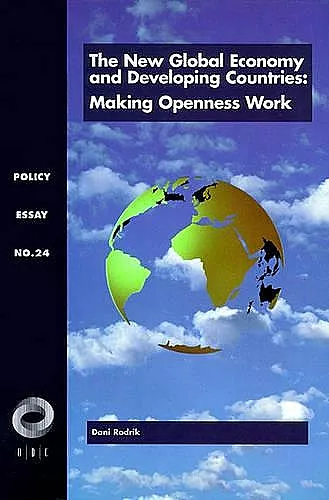The New Global Economy and Developing Countries
Making Openness Work
Format:Paperback
Publisher:Overseas Development Council,U.S.
Published:15th Feb '99
Currently unavailable, and unfortunately no date known when it will be back

The new book that's sparked discussion both in Washington and European financial capitals
Policy makers must reinforce their external strategy of liberalization with an internal strategy that gives the state substantial responsibility in building physical and human capital and mediating social conflicts.Policy makers in the developing world are grappling with new dilemmas created by openness to trade and capital flows. What role, if any, remains for the state in promoting industrialization? Does openness worsen inequality, and if so, what can be done about it? What is the best way to handle turbulence from the world economy, especially the fickleness of international capital flows? In The New Global Economy and Developing Countries Dani Rodrik argues that successful integration into the world economy requires a complementary set of policies and institutions at home. Policy makers must reinforce their external strategy of liberalization with an internal strategy that gives the state substantial responsibility in building physical and human capital and mediating social conflicts.
Rodrik questions the value to developing countries of increasing economic integration, of ever-expanding trade and capital flows. Openness is not essential to economic growth, he argues. It's likely to widen inequality within countries. And, as recent events demonstrate, it leaves developing nations vulnerable to debilitating financial shocks... It's a seductive argument, and it's right in many particulars. Washington Post Dani Rodrik argues that developing nations should not sign globalizing international agreements without participation and agreement by broad social groups within their countries, and says there should be solid evidence-not ideological incantations-to demonstrate that accepting external economic disciplines will actually be good for a country. -- William Pfaff International Herald Tribune Highly informative, thought-provoking, and entertaining. Indeed, it is a must for anybody, policy-maker or theorist, who aspires to think about the economic effects of globalization. -- Christopher Tsoukis Journal of Development Studies
ISBN: 9781565170278
Dimensions: unknown
Weight: 272g
180 pages